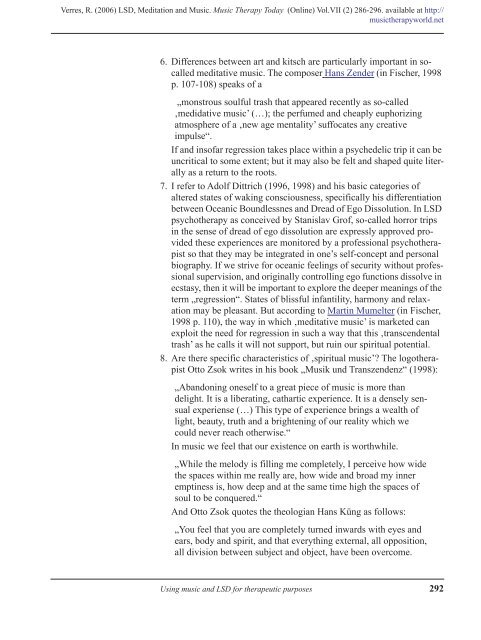Music Therapy Today - World Federation of Music Therapy
Music Therapy Today - World Federation of Music Therapy
Music Therapy Today - World Federation of Music Therapy
Create successful ePaper yourself
Turn your PDF publications into a flip-book with our unique Google optimized e-Paper software.
Verres, R. (2006) LSD, Meditation and <strong>Music</strong>. <strong>Music</strong> <strong>Therapy</strong> <strong>Today</strong> (Online) Vol.VII (2) 286-296. available at http://<br />
musictherapyworld.net<br />
6. Differences between art and kitsch are particularly important in socalled<br />
meditative music. The composer Hans Zender (in Fischer, 1998<br />
p. 107-108) speaks <strong>of</strong> a<br />
„monstrous soulful trash that appeared recently as so-called<br />
‚medidative music’ (…); the perfumed and cheaply euphorizing<br />
atmosphere <strong>of</strong> a ‚new age mentality’ suffocates any creative<br />
impulse“.<br />
If and ins<strong>of</strong>ar regression takes place within a psychedelic trip it can be<br />
uncritical to some extent; but it may also be felt and shaped quite literally<br />
as a return to the roots.<br />
7. I refer to Adolf Dittrich (1996, 1998) and his basic categories <strong>of</strong><br />
altered states <strong>of</strong> waking consciousness, specifically his differentiation<br />
between Oceanic Boundlessnes and Dread <strong>of</strong> Ego Dissolution. In LSD<br />
psychotherapy as conceived by Stanislav Gr<strong>of</strong>, so-called horror trips<br />
in the sense <strong>of</strong> dread <strong>of</strong> ego dissolution are expressly approved provided<br />
these experiences are monitored by a pr<strong>of</strong>essional psychotherapist<br />
so that they may be integrated in one’s self-concept and personal<br />
biography. If we strive for oceanic feelings <strong>of</strong> security without pr<strong>of</strong>essional<br />
supervision, and originally controlling ego functions dissolve in<br />
ecstasy, then it will be important to explore the deeper meanings <strong>of</strong> the<br />
term „regression“. States <strong>of</strong> blissful infantility, harmony and relaxation<br />
may be pleasant. But according to Martin Mumelter (in Fischer,<br />
1998 p. 110), the way in which ‚meditative music’ is marketed can<br />
exploit the need for regression in such a way that this ‚transcendental<br />
trash’ as he calls it will not support, but ruin our spiritual potential.<br />
8. Are there specific characteristics <strong>of</strong> ‚spiritual music’? The logotherapist<br />
Otto Zsok writes in his book „Musik und Transzendenz“ (1998):<br />
„Abandoning oneself to a great piece <strong>of</strong> music is more than<br />
delight. It is a liberating, cathartic experience. It is a densely sensual<br />
experiense (…) This type <strong>of</strong> experience brings a wealth <strong>of</strong><br />
light, beauty, truth and a brightening <strong>of</strong> our reality which we<br />
could never reach otherwise.“<br />
In music we feel that our existence on earth is worthwhile.<br />
„While the melody is filling me completely, I perceive how wide<br />
the spaces within me really are, how wide and broad my inner<br />
emptiness is, how deep and at the same time high the spaces <strong>of</strong><br />
soul to be conquered.“<br />
And Otto Zsok quotes the theologian Hans Küng as follows:<br />
„You feel that you are completely turned inwards with eyes and<br />
ears, body and spirit, and that everything external, all opposition,<br />
all division between subject and object, have been overcome.<br />
Using music and LSD for therapeutic purposes 292

















